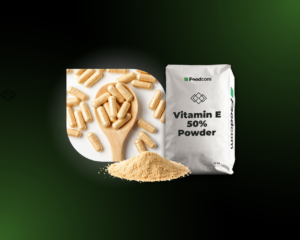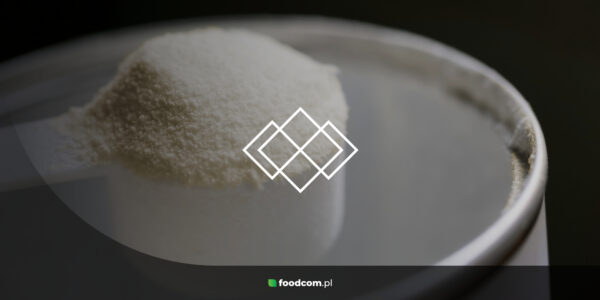- Nutritional additives are very important for the body to function properly.
- They have building, energy and regulatory functions.
- Nutritional additives include Vitamins, Minerals, Proteins or Amino Acids.
- They are important for the production of food and feed.
Food additives are usually used to make food look better, keep it fresh longer, or give it a desired texture. These are functional additives. But there are also nutritional additives that play an important role in the production of food and feed. Read on to learn everything you need to know about nutritional additives! We provide you with a complete overview.
Nutritional additives
Nutritional additives are very important for the body’s nutrition. They are crucial for reproduction, good health and growth. The human body is not able to supply itself all the elements it needs for its functioning. Therefore, we should take some of them with food. Nutritional additives are also used when nutrients are lost or degraded during production. They can be found in nature, for example extracted from plants, but they are also produced synthetically.
However, it should be noted that there are nutritional ingredients and nutritional additives. Nutritional ingredients are generally any substances that an organism needs to survive, grow, and reproduce, while nutritional additives are added specifically to achieve nutritional goals. The most basic classification of nutritional ingredients is to simply divide them into the following categories: carbohydrates, fats, proteins, vitamins, minerals, and water. Nutritional additives, on the other hand, are mainly: proteins, vitamins, amino acids and minerals.
Nutritional additives – functions
As the name suggests, nutritional additives have both nutritional and wellness benefits. Their main role is to build tissues, provide energy and regulate body processes. So we can distinguish:
- building function – these additives help in the formation and regeneration of cells, tissues, organs; such additives are for example proteins or minerals,
- energy function – concerns biochemical transformations that take place in the body, for example fats have energy function,
- regulatory function – refers to the provision of energy necessary for the functioning of the body, such regulatory substances are vitamins and minerals.
Types of nutritional additives
Vitamins
Vitamins are organic chemical compounds that are absolutely necessary for the proper functioning of a living organism. They can be of natural origin or obtained synthetically. Vitamins are exogenous, which means that the body does not synthesize them or does not synthesize them sufficiently, so they must be supplied with food.
Each Vitamin has a different structure and functionality. Based on their solubility, they are divided into two groups: fat-soluble vitamins (i.e. vitamins A, D, E, and K) and water-soluble vitamins (i.e. vitamins B and C).
Vitamins provide a number of health benefits and are involved in a variety of processes. These include supporting the immune system, preventing or delaying certain cancers, strengthening teeth and bones, supporting calcium absorption, maintaining healthy skin, and proper functioning of the brain and nervous system
Minerals
Minerals, like vitamins, are exogenous chemical elements that are essential for humans. A distinction is made between macronutrients, needed in large quantities, which include magnesium, sodium, potassium, calcium, phosphorus, chlorine, and sulfur, and elements that occur in trace form, called trace elements, needed in small quantities, these are: iron, zinc, iodine, fluorine, copper, and selenium.
Among other things, Minerals help maintain healthy skin, hair and nails, improve bone health, support the immune system and normal blood pressure.
Minerals work very closely with Vitamins. There is a close relationship between them – they can support the absorption of others, for example, Vitamin C supports the absorption of magnesium. They can also work together to affect certain processes or organs, for example, vitamin B1 and magnesium work together to help the heart function properly.
Proteins
Proteins are also essential nutrients for the human body – they are one of the building blocks of body tissue. Proteins consist of Amino Acids linked together by peptide bonds. They are found in products of animal origin, but there are also plant-based Proteins.
Proteins perform a variety of functions. They provide for the growth and development of muscles, bones, hair and skin, form antibodies that are essential for immunity, are part of hormones that regulate many processes in the human body, form hemoglobin and can also be a source of energy.
Amino Acids
Amino Acids, as mentioned, build Proteins. There are endogenous Amino Acids, i.e. those that are synthesized in the body and whose requirements can be completely met in this way. These include alanine, asparagine, Glycine, glutamic acid or serine. Exogenous Amino Acids, on the other hand, must be supplied from the outside, along with food. They are for example: Lysine, Threonine, Leucine, valine or Tryptophan.
Amino Acids do not only build proteins. They are also involved in the production of hormones, affect the proper functioning of the liver and central nervous system, support the regeneration of damaged skin, muscles and other body cells, and also serve as a source of energy for physically active people.
Most popular examples of nutritional additives
Vitamin C (Ascorbic Acid) – as an additive, it is known as E300. In foods, it is usually used as a functional additive, an antioxidant, but it also plays various roles in the proper functioning of the human body. Vitamin C accelerates wound healing, strengthens and closes blood vessels, slows skin aging, and regulates Collagen production. In animal feed, for example, it is used to reduce stress in animals.
Magnesium Oxide – it is an inorganic magnesium salt consisting of magnesium and oxygen. It occurs in nature in the form of the mineral periclase, but is also obtained synthetically. Its absence or deficiency in the diet of livestock can cause grass tetany and other disorders, and it is also used to reduce stress in animals.
Potato Protein – it is obtained through cleaning, steaming, and peeling the potatoes. The starch is then extracted with the use of water, resulting in a protein-filled slurry, which is treated with acid and then dried and processed into powder. It is one of the most important ingredients in animal feed – it increases the growth of muscle mass.
Leucine – it occurs as an ingredient in dietary supplements, usually for bodybuilders and people who want to reduce their weight. In animal feed it is important for individuals with low birth weight
Nutritional additives in food
As mentioned earlier, some nutritional additives are not synthesized by the body, or not synthesized sufficiently, so they must be taken with food. They help the body to function properly and enable or improve all necessary processes. Nutritional additives are added to these products, whether they occur naturally or not, to prevent or correct nutrient deficiencies
For example Vitamins A and D are added to margarine, or Vitamin C is added to juices. B Vitamins, folic acid, calcium, iron are added to confectionery products.
Nutritional additives in feed
There are many nutritional additives that are added to animal feed, depending on what is needed. For example, when breeders need to build up the mass of their animals, they add Potato Protein or Lysine. Methionine, for example, also strengthens the animals’ immune system. And when needed to reduce animal stress, Magnesium Oxide is added to premixes.
Why Foodcom?
Our great team of Sales Support will help our Traders conduct the contract and business deals in a smooth and efficient way to ensure the best quality service to all our Business Partners. Our logistics team will take care of transportation and the financial department will be responsible for all matters connected with the financial part of the deal. Do not hesitate! Contact us.









